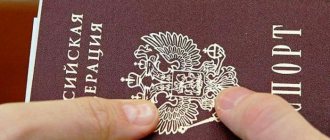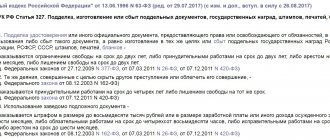1. Theft, destruction, damage or concealment of official documents, stamps or seals, committed out of mercenary or other personal interest, is punishable by a fine in the amount of up to two hundred thousand rubles or in the amount of the wages or other income of the convicted person for a period of up to eighteen months, or by mandatory labor for a term of up to four hundred eighty hours, or correctional labor for a term of up to two years, or forced labor for a term of up to one year, or arrest for a term of up to four months, or imprisonment for a term of up to one year.
2. Theft of a citizen’s passport or other important personal document is punishable by a fine in the amount of up to eighty thousand rubles, or in the amount of the wages or other income of the convicted person for a period of up to six months, or by compulsory labor for a term of up to three hundred sixty hours, or by correctional labor for a term of up to one year, or arrest for up to three months.
3. Theft of excise stamps, special stamps or marks of conformity protected from counterfeiting is punishable by a fine of up to two hundred thousand rubles or in the amount of the wages or other income of the convicted person for a period of up to eighteen months, or by forced labor for a term of up to two years, or by imprisonment. for the same period.
Main
Art. 325 of the Criminal Code contains sanctions for those persons who decide to break the law and steal seals, stamps or other official documents. It is also necessary to point out that this article also establishes liability for those citizens who, out of their personal gain or interest, decided to steal someone else’s passport. Despite the fact that this document belongs to a certain person and serves as confirmation of his identity.
Sanctions for those persons who have committed a criminal act under Art. 325 of the Criminal Code are quite different. The punishment for committing this crime is determined by the judicial authority, based on the requirements of this article.
Qualification by article
The objective side is kidnapping, and the use of violence in the process will be classified according to the totality of crimes, namely, what is provided for by the norm in question of the Criminal Code of the Russian Federation and depending on the severity (nature, consequences) of the harm caused). The situation is similar if a document is stolen in order to then use it to commit another criminal act. In this case, the totality will consist of Art. 325 and preparations for another crime, for example, this could be Art. 30 and 159.1 of the Criminal Code of the Russian Federation.
If a prescription or other document issued in accordance with all the rules for obtaining narcotic drugs or psychotropic substances was stolen, and then it was forged, then these actions are qualified in their entirety - the article under study and Art. 233 of the Criminal Code of the Russian Federation.
The subjective side of parts 2, 3 of the article under study is expressed by direct intent. To qualify a crime under Part 2, it is necessary that the person understands that he is stealing not a simple, but an important document, and wants to steal it. If the main motive was any personal items (purse, wallet, etc.), and, for example, a passport or driver’s license was accidentally included with them, then the crime is not subject to qualification under Article 325.
Theft, destruction and damage
The social danger of this criminal act lies in the fact that the perpetrator, through his illegal actions, violates the established procedure for maintaining official documentation. After all, theft, as well as damage or destruction of seals and stamps does not provide an opportunity to continue carrying out official activities at the enterprise.
The perpetrator always acts out of self-interest or personal interest. It is possible that he wants to receive a ransom for the return of official documents, seals and stamps. Or, for example, return the stolen property in exchange for employment in a given institution.
Characteristics of the subject and subjective side
The subject of the criminal act in this case is determined in accordance with Art. 19, 20 of the Criminal Code of the Russian Federation. He is a physical person. face. It must be sane and over 16 years old.
The subjective side, that is, the mental, internal attitude of a person (the perpetrator) to the crime he himself commits, is characterized by intent (direct) and selfish or other personal interest (special motives). As a rule, self-interest involves the subsequent sale (sale) of stolen items. For a criminal, personal interest may be expressed in the desire to obtain personal benefits. For example, benefits for admission to an educational institution, for additional leave, obtaining sick leave, etc.
Sanctions under part one
If the culprit has stolen, destroyed, damaged or hidden official documents, seals and stamps, then he may face the following punishment, prescribed in Part 1 of Art. 325 CC:
- a fine of up to 200 thousand or in the amount of the offender’s income for a period of up to one and a half years;
- compulsory work only for a period of up to 480 hours;
- corrective labor for up to 2 years;
- forced labor for a period of up to one year;
- arrest for a maximum of 4 months;
- the most severe is imprisonment for up to a year.
This list is exhaustive. Therefore, when assigning punishment for committing this crime, the court can choose only one of the sanctions prescribed in part one of Art. 325 CC.
Personal documents
Part 2 art. 325 of the Criminal Code contains punishment for those citizens who decided to steal another person’s passport. Or other personal documents that belong to another person (for example, SNILS, marriage certificate, military ID).
A passport is an official document with which officials can accurately establish a person’s identity. Thus, its theft can cause the victim a lot of trouble and even problems with the law.
For this reason, when contacting the Federal Migration Service with an application to restore a lost passport, employees of this service often send citizens to the police in order to officially record this case of loss of an important document.
The theft of what documents is punishable?
There are several common types of theft, which are divided according to the subject of the theft: personal or official papers.
- Accounting acts
These include accounting registers and primary documents. There is no consensus on whether such papers are considered official documents, but, nevertheless, the type of theft will depend on its purpose. In any case, after discovering the loss, you need to contact the police department. Employees must come to the crime scene and draw up a report that will confirm the fact of theft. This is necessary to initiate a criminal case.
After this, you need to write an application to the tax service, where you need to indicate the fact of theft of documents. You must submit an application for document restoration within forty days. And this process must be completed no later than the end of the tax period, otherwise you will be charged a penalty for the underpaid tax.
Important: after discovering a loss, you must contact the police and the tax service as soon as possible. If you don't do this, you will be charged extra taxes.
- Documents for the car
Car documents refer to personal documents (driver's license and car papers, including technical passport). Their theft is also subject to criminal liability. There are cases when criminals steal documents and then offer to return them for a reward. This already applies to blackmail.
If you notice that your car documents have been stolen, try placing an ad in the newspaper and on the Internet. If there is no result, then immediately contact the police and file a statement about missing documents. When drawing up a statement, you must describe in detail the details of what happened. After this, the employees will open a criminal case, and you will be given a certificate confirming this. With this certificate, you will need to go to the traffic police in the exact department where you registered the car. You will write an application for restoration of the registration certificate and pay the state fee, after which the expert will check the body and engine numbers and check the car. After the inspection, you should be issued a new registration certificate.
In order to reinstate your driver's license, you will also need to pay a state fee. In the meantime, the document will be under development, you will be given a temporary license, as is the case with a temporary passport. See more about this at the end of the article.
- Theft of papers for an apartment
Also read: Shoplifting - what is the punishment
Immediately after you notice the theft of documents, the Criminal Code of the Russian Federation recommends immediately contacting the police and Rosreestr.
- First, file a police report. After this, you will urgently need to restore 2 documents: a certificate of registration of your rights to the apartment and title papers.
- After which the apartment will be supervised so that fraudsters will not be able to do anything with the housing.
In all cases, regardless of what documents were stolen, you need to act quickly. There are situations when attackers, having received a document, begin to blackmail the victim or, even worse, take out loans for her and sell apartments.
What awaits
What punishment can a person receive for stealing someone else’s passport or other personal document? According to part 2 of Art. 325 of the Criminal Code of the Russian Federation, sanctions here may be as follows:
- arrest (maximum 3 months);
- a fine of no more than 80 thousand or the amount of the offender’s income for a period of up to 6 months;
- compulsory work here can only be assigned for 360 hours;
- corrective labor for up to one year.
It should be noted right away that there is no prison sentence for a person who stole someone else’s personal documents. As practice shows, the guilty person is sent by the court to correctional labor or pays a fine in the amount specified in the sentence.
In what cases can you avoid liability for document theft?
There are comments to the article. Thus, according to Article 325 of the Criminal Code of the Russian Federation with commentaries, the public danger of theft is a violation of the order of official document flow in the company, as well as the rights of citizens mentioned in these documents. Any document conferring rights and obligations, or releasing them, issued by an authorized person or organization is considered official. Therefore, judicial practice does not consider papers, for example, test purchase acts, which were not drawn up by an official, as official.
Also read: Plenum on theft, robbery and robbery
IMPORTANT: The document thief will not be found guilty if:
- the documents were not used for personal gain, but were returned to their rightful owner voluntarily;
- the criminal himself came to the police station, admitted to committing the crime and handed over the stolen documents intact, without any damage;
- the kidnapper himself contacted the victim, voluntarily gave the documents to the owner and reached a peace agreement with him.
Other acts against law and order
Quite often, criminals, out of selfish interest or to commit a serious act, remove state registration plates from cars. Responsibility for the crime is prescribed in Article 325.1 of the Criminal Code of the Russian Federation. In practice there are quite a lot of such cases.
Most criminals are determined to receive a monetary reward in the future for returning the numbers. In certain cases, this action is performed in order to carry out a more serious crime.
For unlawful seizure of vehicle license plates, the offender may be imprisoned for a period of up to one year. This act also violates public order and security. After all, state license plates are recorded in the traffic police database.
Subjects of the unlawful act
According to Article 325 of the Criminal Code, the actions of attackers are aimed at stealing and damaging, as well as concealing official documents, seals and stamps, a person’s passport, stealing excise stamps and marks of conformity. They will be the subjects of a crime. According to the first part of this article, their list is considered exhaustive:
- official documents, for example, the charter of the organization, power of attorney to manage the company, papers confirming the legality of the activity;
- seals and stamps (stamps, for documents).
This act will be completed at the moment when the culprit has carried out his illegal actions (stolen and damaged documents, seals for the purpose of personal interest, for personal gain).
According to the second part of the same article, the subject of the crime is the citizen’s passport or his other personal documents. These include: insurance certificate, tax identification number, military ID, driver's license. Because thanks to these documents, a certain citizen can exercise his rights and obligations without breaking the law. In turn, if these documents are stolen, a person is deprived of this opportunity.
The subjects of the crime under part three of this article are excise stamps and marks of conformity. The state protects them from counterfeiting. Marks of conformity are not considered documents. They are manufactured using special technology and applied to products that must be certified.
Subject of the crime
As you know, the subject of a crime refers to people and things that were directly targeted by the criminal act. Within the meaning of part of the first norm under consideration (criminal law), these include seals and stamps, as well as official documents. Let us indicate what exactly is meant by this formulation.
A print is a printing form containing graphic symbols (images, drawings or text) that is used to make prints on paper or other surfaces. The details reflect the name of the organization, a drawing or logo, and it is possible to use the coat of arms of the Russian Federation. Stamps are also printing forms, but differ in content. They are marked with the full name of the institution, its legal address, the originating document number and its date.
It should be remembered that actions carried out with the listed items (seals and stamps, official documents) belonging to non-state institutions do not constitute a crime.
A comment
So, every citizen of our country should know that there is liability for the theft, damage and concealment of official documentation, seals, stamps, citizen’s passports, theft of excise stamps and marks of conformity that are applied to certain types of products. The punishment for the crime is stated in Art. 325 of the Criminal Code of the Russian Federation. I can only agree with her comments. This act is considered completed only at the moment when the perpetrator commits his illegal actions.
The subject of a crime can only be a sane person who is already sixteen years old. If the perpetrator has not reached the specified age, then he cannot be held accountable for his actions.
Commentary on Article 325 of the Criminal Code of the Russian Federation
1. Subject of the crime:
— official documents, stamps and seals (Part 1 of Article 325);
— passport and other important personal document (Part 2 of Article 325);
— excise duty stamps, special stamps and marks of conformity protected from counterfeiting (Part 3 of Article 325).
Official documents are written acts emanating from state authorities or local governments or from non-governmental organizations within their competence, as well as written acts addressed to specified legal entities that certify acts of legal significance. Documents emanating from a private individual can be official if they are drawn up in accordance with current legislation and are binding on the addressee (for consideration and (or) execution).
2. According to the Convention Abolishing the Requirement for Legalization of Foreign Public Documents (1961) <1>, the following are considered as such:
——————————— <1> Bulletin of international treaties. 1993. N 6. P. 13 - 17.
- documents emanating from a body or official subject to the jurisdiction of the state, including documents emanating from the prosecutor's office, court secretary or bailiff;
— administrative documents;
— notarial acts;
— official notes, such as registration marks;
— visas confirming a specific date;
— certification of a signature on a document not certified by a notary.
3. It should be borne in mind that the commented article refers to a wider range of official documents than in Art. 324 CC; their characteristics are not limited to the granting of certain rights or exemption from obligations.
A stamp is a hand-held printing form (usually triangular or rectangular), intended for making impressions when drawing up documents, with a convex reverse image of the details of an authority, institution or organization, containing space for variable information (number, date, etc.).
A seal is a printed (usually round) form (cliché, special device, device) with the corresponding details of an organ, institution, organization or specific person (for example, a doctor) for making an impression on a certain material (paper, wax, lead, plasticine and etc.), intended to certify the signature of a competent person or any fact.
A passport is an official identification document. It can be domestic, foreign, diplomatic, official, seafarer.
Another important personal document is a collective concept that includes official documents that grant a person any rights or exempt them from performing certain duties (military ID, work book, diploma, refugee or forced migrant certificate, etc.).
An excise stamp (excise stamp) is a document certifying the payment of a fee when importing into the country a certain type of product (alcohol, tobacco), jewelry, gasoline, cars and certain types of mineral raw materials into the territory of the Russian Federation.
A special mark is a document intended for marking certain types of products and services to confirm the legality of their production on the territory of the Russian Federation.
Mark of conformity is a designation used to inform purchasers about the compliance of the certification object with the requirements of a voluntary certification system or a national standard.
4. The objective side of the crime is characterized by one of the following actions:
1) theft - illegal possession of an official document, stamp, seal, passport, other important personal document, excise duty stamps, special stamps and marks of conformity protected from counterfeiting, in any manner prescribed by law (theft, fraud, robbery, etc.) ;
2) destruction - rendering an item completely unusable;
3) damage - rendering an item partially unusable;
4) concealment - concealing an item, storing it in a place in which access to it by an authorized person (owner) is difficult or completely excluded.
5. Only official documents, stamps and seals can be the subject of destruction, damage and concealment. The listed acts in relation to a passport, other important personal document, excise duty stamps, special stamps and marks of conformity protected from counterfeiting do not form part of the crime in question.
6. The crime is completed from the moment the act specified in the law is committed, taking into account its peculiarities.
7. The subjective side of the crime is characterized by direct intent. The crime provided for in Part 1 has a special motive - selfish or other personal interest.
8. The subject of the crime is a person who has reached the age of 16 years.
Important
So, when committing this crime, the perpetrator must be fully aware of the illegality of his actions. In addition, the criminal here can be any person and even an employee of the organization from which the documents or seal were stolen. Most often this is what happens. Moreover, the perpetrator always acts only out of selfish goals and personal interest. For example, an employee needed to steal documents in order to help his relatives. The latter realized that he was acting illegally, but nevertheless decided to do it. There are quite a lot of such cases. Some people commit this act out of personal revenge on someone. In other words, the perpetrator carries out illegal actions intentionally.
Contents of Art. 326 TK
At the beginning it is stated that employees who are employed by federal government agencies and extra-budgetary funds located in the Far North and similar regions, and who come from other regions for this work, are provided with the following benefits at the expense of the employer:
- One-time benefit for a civil servant and his family. Amount of payments: two monthly salaries for the employee and half of it for each family member.
- Compensation for relocation costs for a civil servant and his family within the borders of the Russian Federation. Its amount is calculated on the basis of actual costs, but not higher than the corresponding tariffs provided by the railway. Carriage of items weighing up to five tons is also paid.
- Seven-day targeted leave for settling a civil servant.
It is emphasized that the opportunity to receive payment for compensation of costs associated with moving and transporting things remains with family members of a civil servant for a year after the execution of an employment contract.
It is stated that an employee working in a federal government agency or extra-budgetary fund located in the Far North and similar regions, in the situation of termination of an employment contract for any reason (except for guilty acts) and moving to live in another region, is compensated for the costs associated with:
- moving;
- carrying items weighing up to five tons.
This compensation has the following nuances:
- it also applies to family members of a civil servant;
- also applies upon the death of an employee;
- its value is determined on the basis of actual costs, but not higher than the corresponding tariffs provided by the railway.
It is emphasized that the benefits enshrined in Art. 326 for civil servants, they are entitled to at their main place of work.
The conclusion lists the features of compensation for costs associated with moving and transporting things for other categories of employees involved in the regions of the Far North and equivalent territories.
It is indicated that for employees employed in regional government agencies and territorial compulsory medical insurance funds, the nuances of these payments are determined by the relevant acts of regional government bodies.
For employees employed by local governments and municipalities, the nuances of these payments are determined by the relevant acts of local authorities.
For other employees, the nuances of these payments are determined in:
- collective or individual labor contract;
- local act of the employer, approved by him after consultation with his existing trade union.
The analyzed article, as can be seen from its content, regulates in detail the procedure for processing appropriate payments for federal-level civil servants. For employees involved in the private sector, this procedure is determined through agreements with a specific employer. In general, this article is aimed at encouraging new workers to move to the Far North and similar regions.
Characteristic
Many citizens of our country do not even know that there is any liability for the theft of a passport or other personal documents. Nevertheless, there is a punishment for this act; it is fixed in Art. 325 CC. The commentary to it once again confirms this fact. Here it must also be said that for the theft of excise taxes and conformity stamps protected from forgery, the punishment is more severe than for theft and damage to official documents and stamps. After all, for committing such an act you can even lose your freedom for up to two years.
It should also be noted that Article 325 of the Criminal Code is divided into three parts, each of which has its own qualifying characteristics and sanctions.
Procedure in case of passport theft
If a passport is stolen, the article of the Criminal Code of the Russian Federation is the same - 325th. Have you found yourself in a similar situation when an attacker stole your document right on the street or tricked you into giving it up voluntarily, and then disappeared? You definitely need to contact law enforcement agencies and restore the document as soon as possible. Otherwise, you will be left without the most important document and will not be able to take any actions. And what’s even worse is that you yourself will fall under criminal liability under the article “illegal residence on the territory of the Russian Federation”
- Therefore, first of all, go to the nearest police station and write a statement about the theft of documents. Otherwise, you will have to pay a fine for losing your passport, and you will not be able to punish the criminal.
- Then immediately go to the Federal Migration Service at your place of residence and attach a certificate confirming the fact that the document was stolen. Law enforcement agencies should give you one. Don't forget to take with you a police certificate confirming the theft.
How to recover a stolen passport?
Since a passport is the main document of a citizen of the Russian Federation, if it is stolen, you must contact the authorized authorities.
In order for you to be issued a new document, you need to write a statement to the police and, with the received certificate, go to the FMS department. In this case, you will not have to pay a fine for losing your passport. In addition to this, you will need to attach several more documents: photographs, proof of payment of the state fee and other personal documents that you will be told about.
By the way, a copy of a foreign passport can speed up the process of issuing a new document, so if you have one, be sure to take it with you as an identity document.
By law, you must be issued a passport within two months. But this is too long a time for a person to live without a passport. Therefore, immediately after contacting the authorities, you must be issued a temporary document replacing a passport.
The document is similar to a passport, where information about the citizen is indicated on the inside, and on the outside there is the inscription “Temporary identity card of a citizen of the Russian Federation.” It also contains a photograph and signature of the person. In addition, the last page indicates the reason for issuing the document and its validity period.
Bottom line
All law-abiding citizens of Russia should have at least a little understanding of the norms of criminal law. After all, this can prevent them from committing illegal actions. As practice shows, employees of the same institution in which the crime was committed are usually prosecuted for the theft and damage of documents. Interestingly, seals are often stolen by people who work with them for personal gain. For example, one employee took a stamp from another and did not return it, and the latter was fired due to the fact that he was dishonest in his duties.
Citizens are rarely punished for theft of personal documents. Because it is not always possible to prove the fact that one citizen took a passport or TIN from another. Moreover, a person could simply lose his documents through negligence.
The situation is a little more complicated with excise stamps and marks of product conformity, because they are protected from counterfeiting. However, it often happens that they are kidnapped by the perpetrators for a specific purpose - to attach them to illegally produced products. Therefore, the sanctions for carrying out such an act are more stringent.








